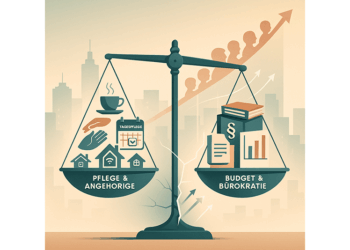Can you imagine a life without smartphones and computers? Digitalization is already permeating all areas of life – from communication and the world of work to healthcare. Both at work and in our private lives. But what price are we paying for technological progress? Science warns that the constant, purely stimulating use of digital technologies is impairing our cognitive abilities and will lead to a wave of dementia in the future.
In his book “Digitales Unbehagen: Risiken, Nebenwirkungen und Gefahren der Digitalisierung” (Digital discomfort: risks, side effects and dangers of digitalization), the well-known neuroscientist and psychiatrist Manfred Spitzer gets to the bottom of the health-threatening side of the digital transformation. He has been medical director at Ulm University Hospital since 1998 and is the overall director of the Transfer Center for Neuroscience and Learning, which opened there in 2004.
Why are we addressing this issue?
Because Spitzer, together with international scientists, assumes that the excessive use of digital media will lead to a dramatic increase in dementia patients. The increasing dependence on digital systems could lead to users losing essential cognitive and practical skills. The brain relies on regular mental challenges to maintain its performance. The automation of many cognitive processes – be it through navigation systems, voice assistants or algorithms that take over decision-making – removes an important stimulus for the brain.
For years, the scientist was attacked for this statement. Today we know: He was right. Digital dementia is now an officially recognized clinical picture. Studies show that dementia does indeed occur when the brain is no longer used properly.
How mindless entertainment changes our thinking
Are we losing our minds, our ability to think, due to digitalization? According to the German Alzheimer’s Society, around 1.8 million people in Germany were living with dementia at the end of 2023. In Austria, it is estimated that between 130,000 and 150,000 people are affected by this disease. Dementia, in Latin, is the decline of the mind, the erosion of personality, memory and the ability to speak. We forget how to walk, how to eat. We owe the control of our body to our mind. And when this slowly disappears, we virtually lose our hard disk – to stick with a digital term.
The WHO assumes that today’s figures will double by 2050. According to Canadian psychologists: The number will increase four- to six-fold. This is because the WHO is based on experience with people who spent their youth in the 50s and 60s of the 20th century. And there was no digital media back then. Back then, people read books and spent the day playing in the great outdoors. According to Spitzer, these activities “wired something up” and our brains learned as a result. In the passive use of smartphones and tablets, studies have shown that nothing is wired.

A central aspect of Spitzer’s analysis is therefore the long-term effects of digital dementia. The neuroscientist describes how the constant use of digital technologies impairs our cognitive abilities. And not by working with digital tools, but by immersing ourselves in social media. Being bombarded with videos from Facebook and Tiktok. According to Spitzer, our brain changes with its use. And if it’s just being fed, it’s not capable of much else.
Children and young people: Ensuring a good starting point
As with so many other topics, the same applies here: The dose makes the poison. He argues that excessive media consumption – especially in young people – prevents the brain from developing basic thinking skills such as memory, critical thinking and problem solving independently. For children and young people in particular, he therefore advocates training the brain without smartphones, tablets, etc. Spitzer draws parallels between digital dementia and the effects of physical inactivity on the muscular system: those who hardly move break down muscles – and those who do not actively challenge their brain lose mental abilities.
This is particularly dangerous for children and young people whose brains are still developing. He refers to studies that show that excessive consumption of digital media correlates with reduced activity in the areas of the brain responsible for memory and learning. He warns against attention disorders: The constant distraction caused by digital stimuli leads to the brain undergoing less in-depth learning processes. This not only impairs short-term memory, but can also weaken long-term cognitive performance.
In the long term, this could not only impair academic performance, but also increase the risk of dementia later in life. A better trained brain protects against mental decline. Because our nerve cells break down when we get old. A well-trained brain descends from a higher mountain, and the descent takes longer. A lack of training means descending from a lower mountain.
Politicians have now become aware of this problem: In Sweden, digital textbooks have been abolished again and “real” textbooks have been reintroduced. In France, smartphones are only permitted from the age of 13 and social media only from the age of 17. In the USA, some states have taken measures to restrict the age of use of social media for minors.
A polarizing analysis with potential for discussion
Spitzer’s book is an important wake-up call for everyone involved in digitalization – whether in a private, professional or social context. However, critics accuse him of taking a one-sidedly negative view without sufficiently acknowledging the opportunities of digitalization. A more differentiated view would be desirable, especially for sectors such as smart buildings, where technological innovations offer many advantages.
“Digital Discomfort” is a provocative but readable book that encourages reflection on the responsible use of digital technologies. The debate about digital dementia is particularly relevant as it could have far-reaching consequences for our society and future generations. Anyone interested in the effects of digitalization on cognitive abilities will find valuable food for thought here – and should critically reflect on Spitzer’s theses in order to draw the right conclusions for a balanced digital future.
Sources:
- Book: “Digital discomfort – risks, side effects and dangers of digitalization” by Manfred Spitzer
- Podcast by thepioneer.de, Gabor Steingart in conversation with Manfred Spitzer: “We need to limit the influence of TikTok, Insta and co. on young people”
Author: Anja Herberth
Chefredakteurin















